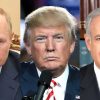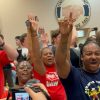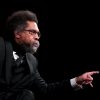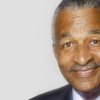In the context and currents of human history, African liberation is an awesome ongoing historical project and a living practice of daily life. It is that long, hard and heroic struggle Black people wage everywhere to resist and radically reject the imposition of White supremacy in all its savage and subtle forms, and to secure freedom, justice, power, peace and serious and sustained progress in our lives and the world. And it is the daily personal and social practices we engage in to end oppression, avoid social seduction and cultural entrapment, and create and sustain free space to be our African selves, live lives of dignity, decency and meaning and aid the overall struggle for liberation and ever higher levels of human life.
In a larger sense, African liberation is part of the overall struggle for human liberation and we are, as Amilcar Cabral taught, “anonymous soldiers” for the whole of humanity. For every inch, acre, kilometer and mile, country, region or continent we free or help free expands the realm of human freedom and flourishing in the world. We are a world African community and as the Hon. Marcus Garvey taught us, the whole world must be our area of attention and activity where Africans are concerned. Thus, in this country from Ferguson and Flint to all points east, west, south and north, we must continuously wage the righteous and relentless struggle for racial justice, a lived and inclusive freedom, and the conditions for maximum human flourishing. And in the continuing struggles, hushed and distorted by the corporate media in Darfur, the Niger Delta, Haiti, Venezuela, Colombia, Brazil, Cuba and elsewhere, we must stand in solidarity with our people, and aid them in any way we can. And we must stand in solidarity with all oppressed, struggling and progressive people, and be in the vanguard of all just causes.
As Cabral noted, our primary duty is the liberation of our immediate people, nation and country. But as he, Malcolm, Kwame Nkrumah and Mary McLeod Bethune informed us, unless we link our struggles to other peoples of the world, we isolate ourselves, fail to achieve needed strength, leave more passive or active allies for our oppressor and ultimately hinder and hurt our just cause. Malcom taught us we are part of the rising ride of human history, that rising tide of righteous and relentless resistance that seeks to redraw the map of African and human history. In a word, it is, in the teachings of Mary McLeod Bethune, an awesome striving “to remake the world” and in the spirit and aspiration of Frantz Fanon, daring “to start a new history of humankind”.
Since the Sixties our organization Us has taught that at the core of our struggle must be a clear philosophy and at the heart of our practice, compelling principles. Our philosophy is Kawaida, an ongoing synthesis of the best of African thought and practice in constant exchange with the world. Our fundamental principles are the Nguzo Saba (The Seven Principles) which is an African value system that establishes standards and priorities which in turn offers possibilities, pointing toward the victory for the struggle we wage and toward a vision of the life we struggle to bring into being and live.
On this African Liberation Day, May 25, this day of recommitment to our liberation struggles, let us recommit ourselves also to these core principles which have been embraced throughout the world African community as a path to liberation and a living practice of good in the world. The first of these principles is Umoja (Unity) which calls for our active unity, as a people in struggle, and for our feeling a deep and enduring sense of kinship with all African people, a kinship rooted in history, blood, culture and struggle. This means we must feel deeply the oppression and suffering of the sisters and brothers everywhere and find and support ways to relieve and end it. It means especially identifying with and aiding the people of Haiti whose brave and unbreakable spirit honors us all and in whose resilient humanity we recognize our own. And so, again, it is with Africans everywhere.
The principle of Kujichagulia (Self-Determination) calls on us to constantly dialog with our culture and extract and put into motion its models of human excellence and achievement and its paradigms of possibility. It requires a radical rupture with the anti-human ideology and practical insanity of the oppressor and a righteous and relentless struggle to think and act African and free, and to create the conditions for the possibility and practice of both. Indeed, as Frantz Fanon taught, real liberation means “not only the disappearance of colonialism, but also the disappearance of the colonized man” and the colonized woman. Likewise, liberation means not only the end of enslavement and White supremacy, but the end of the enslaved-minded and white-worshiping man and woman.
As Min. Malcolm taught, “we must launch a cultural revolution…and recapture our heritage and our identity, if we are every to liberate ourselves from the bonds of White supremacy.” And this requires our rooting out every inch, ounce, and iota of the data of domination in us and daring to approach the world and conduct ourselves within the context of the best of our own culture.
The third principle Ujima (Collective Work and Responsibility) calls for the active engagement of African people in liberating ourselves and building the good world we all want and struggle for. It is we who must fight for freedom and justice, secure the necessities of life, overthrow oppressors of all kinds and develop real social and economic democracy, and do the ponderous work of building peace. And it is the masses of African people who must protect and promote human rights, recover and reconstruct their culture and use it to imagine and bring into being a new way of being human in the world.
The fourth principle is Ujamaa (Cooperative Economics) which calls for the practice of shared work and shared wealth. It reaffirms the right of African people to their human and material resources, rejects capitalist, corporate and predator-country claims of debt and their imposition of anti-people policies. And it supports reparations and recovery of stolen riches, and calls for an equitable distribution of each countries’ wealth in the interests of the well-being and flourishing of the masses.
The fifth principle Nia (Purpose) calls for our commitment to the collective vocation of an African renaissance, returning Africa and the world African community to their traditional greatness as self-conscious bringers of good in the world, peacemakers, protectors of the poor and vulnerable, allies in all just causes, and weighty partners in imagining and bringing into being a new history of Africa and humankind.
The sixth principle Kuumba (Creativity) calls on us to heal, repair and transform the world, doing all we can in the way we can in order to leave our communities and the world better, more beautiful and beneficial than we inherited them. And finally, the principle of Imani (Faith) calls on us to believe in ourselves and our people and in the righteousness and victory of our struggle; to hold fast and firm to our faith in the good and our capacity to create and share it and pass on to our children a future, forged and framed in freedom, justice, empowerment, progress and a just and enduring peace in the world.
Dr. Maulana Karenga, Professor and Chair of Africana Studies, California State University-Long Beach; Executive Director, African American Cultural Center (Us); Creator of Kwanzaa; and author of Kwanzaa: A Celebration of Family, Community and Culture and Essays on Struggle: Position and Analysis, www.AfricanAmericanCulturalCenter-LA.org; www.OfficialKwanzaaWebsite.org; www.MaulanaKarenga.org.















